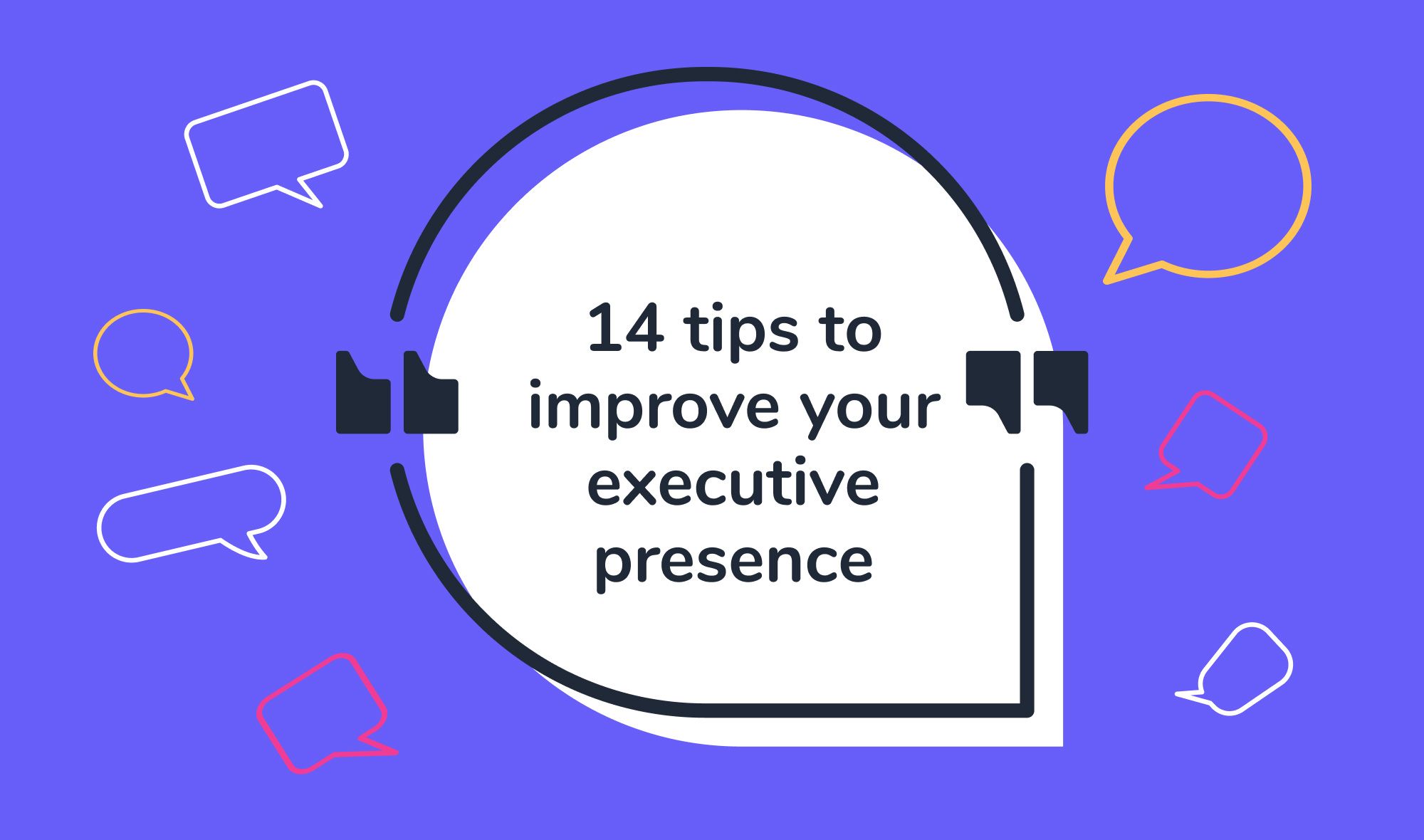Executive presence: why you need it and how to get it
By Remy Meraz • July 28, 2023

Great leaders throughout history have often been characterized by their strong executive presence. They possess the ability to project confidence, authority, and credibility, which inspires trust and respect in others.
One example of a leader with a strong executive presence is Winston Churchill. During his time as the Prime Minister of the United Kingdom, Churchill was known for his powerful speeches and commanding presence. He had a unique ability to inspire and motivate the British people during World War II, through his speeches and his strong, confident leadership. He was able to project a sense of authority and determination, which helped to rally the country during a difficult time.
In this blog, we will focus on the importance of executive presence and provide practical tips and strategies for developing and enhancing your own executive presence. Whether you're a seasoned professional or just starting out in your career, understanding and cultivating executive presence can be a valuable asset in achieving your goals.
Definition of Executive Presence

Executive presence refers to the ability to project tenacity, authority, and reliability in a professional setting. It encompasses a variety of factors, including communication skills, personal appearance, and body language, as well as the ability to inspire trust and respect in others.
Why it's important to build this presence?
Executive presence is important because it helps leaders convey determination and assurance. This can lead to greater trust and respect from employees, peers, and stakeholders, and can help leaders effectively communicate their vision and strategy.
Additionally, executive presence can help leaders navigate complex situations, build and maintain relationships, and inspire and motivate others to achieve organizational goals.
Benefits of having a good executive presence
Executive presence is a crucial element for success in the modern business world. Let's take a closer look at some of the top benefits associated with developing a solid executive presence.
Improves organizational performance
Overall, leaders with executive presence are perceived as more effective and can have a positive impact on organizational performance. By effectively communicating their vision and strategy, they are able to engage employees, increase alignment, and build trust with their team, leading to increased buy-in for their decisions.
Additionally, senior leaders who demonstrate executive presence are able to build and maintain strong relationships with employees, peers, and stakeholders, which can lead to more effective collaboration and teamwork.
Strengthens company culture
A leader with a strong executive presence can set the tone for the organization and model the behaviors and values that the company wants to promote. This can help create a culture of trust, respect, and accountability, where employees feel heard and valued.
Leaders with executive presence also have the ability to inspire and motivate others to achieve organizational goals, which can create a sense of shared purpose and a positive work environment.
Helps leaders manage their teams
Another key benefit to developing a stronger executive presence is improving the way you manage your team. When those in higher-up positions demonstrate the ability to navigate complex situations with poise and make sound decisions in the face of adversity, this can lead to more effective problem-solving and decision-making at a team level.
By setting an example and following through, an effective leader can make their team feel empowered and inspired to perform at optimal levels.
14 tips to improve your executive presence

Now that you understand how imperative it is to have a powerful presence in your professional life, you may be asking how you can develop executive presence and become a more successful leader. Here are 14 practical ways that over time will help you act decisively, command attention, and display confidence.
1. Identify your personal brand and values.
Your executive presence is closely tied to your personal brand and the values that you stand for. Identifying these will help you communicate with authenticity and certainty.
To identify your personal brand, start by considering your unique strengths and the value you bring to others. Think about your interests and passions, and how they align with your career or industry. You may also want to consider your values and what you stand for, as well as any experiences or accomplishments that set you apart.
Once you have a clear understanding of what makes you unique, you can use this information to create a personal brand statement and develop a consistent image and message across your professional platforms, such as your resume, LinkedIn profile, and social media accounts.
2. Practice effective communication.
Being able to communicate clearly and effectively is a crucial aspect of executive presence. This includes being able to practice active listening, speak with confidence, and use appropriate body language and nonverbal cues.
If you'd like to improve your listening skills, for example, find a partner and take turns having a conversation, but instead of responding, the other person should simply reflect back on what they heard. This will help you become more aware of how well you are listening and communicating.
3. Develop your leadership skills.
Executive presence also requires strong leadership skills, such as the ability to inspire and motivate others, make tough decisions, and effectively manage and delegate tasks. Oftentimes, people are placed into leadership positions without possessing the natural skill set to accomplish these objectives, and if they also lack the self-awareness to seek out professional development, this can be detrimental to morale.
Executive coaches can be a great resource for new and experienced leaders alike who want to refine their leadership style with the guidance and support of a seasoned professional. If you have experience in your industry but have struggled to advance your career path, executive coaching could be the missing link.
4. Build relationships and networks.
Networking and building relationships are important parts of developing executive presence. Building a network of influential people can help you gain visibility and credibility within your organization and industry.
Joining a professional development group, such as Toastmasters International or the National Speakers Association (NSA), can provide opportunities to exercise your new habits in front of your peers before you try them out with your team.
5. Be decisive.
Executives are often called upon to make tough decisions, and the ability to do so with confidence is a key aspect of executive presence. When faced with complex problems, good leaders must be able to evaluate multiple options, weigh the potential risks and benefits, and choose the best course of action. This requires a high degree of emotional intelligence, strategic thinking, and the ability to remain calm under pressure.
6. Manage your emotions.
Managing your emotions and reacting calmly under pressure is essential for maintaining an executive presence. Flying off the handle is a quick way for even great leaders to lose the faith and support of their team members.
If you find yourself struggling to stay calm, take time to reflect on your own emotions and understand how they influence your thoughts and actions. How do you feel, and why do you feel this way? How does the other person in the situation feel and why? These types of introspective conversations will foster a greater capacity for emotional intelligence and control, as well as encourage personal development overall.
7. Take care of your appearance.
Dressing appropriately for the occasion and maintaining good personal grooming habits are important for making a positive impression. While poor grooming habits or inappropriate attire can undermine your credibility and make it more difficult to establish a positive rapport with others, presenting yourself in a professional and polished manner can help you command respect and gain the trust of others.
Additionally, maintaining good personal grooming habits can also boost your own self-confidence and help you to feel more in control of situations. Overall, taking care of your appearance is an important aspect of executive presence and can play a big role in how you are perceived by others.
8. Practice presence and mindfulness.
Being present and mindful in the moment can help you communicate with authenticity and assurance.
Let's say that you are a brand new manager and are nervous to begin leading meetings in your new role. The act of simply taking a deep breath can activate the parasympathetic nervous system, which is responsible for slowing down the heart rate and relaxing the muscles. This helps to reduce feelings of stress and anxiety, giving you the courage to speak more clearly and confidently.
9. Demonstrate integrity and authenticity.
Executive presence requires being true to your values and acting with integrity. Being authentic and genuine can help build trust and credibility, which is important for anyone in a leadership position.
Integrity and authenticity are qualities that can take time to develop, but through consistent effort, self-reflection, and the practice of honest communication, accountability, and self-reflection, one can improve on these personality traits. These qualities can help individuals to build stronger relationships, establish greater trust and respect with others, and be more effective in both their personal and professional lives.

10. Show empathy and emotional intelligence.
Demonstrating empathy and emotional intelligence can help you connect with others and build strong personal and professional relationships. Empathy is the ability to understand and share the feelings of others, and emotional intelligence is the ability to recognize, understand and manage one's own emotions and the emotions of others.
When you are able to put yourself in the shoes of others, understand their perspective, and respond to them in a compassionate and understanding way, it can help to build trust, respect, and positive relationships.
11. Use storytelling to communicate effectively.
Storytelling is a fantastic tool for facilitating powerful communication, and it can help you engage and inspire others. One historical example of when storytelling helped facilitate powerful communication is when Martin Luther King Jr. delivered his famous "I Have a Dream" speech during the Civil Rights Movement in 1963.
By using storytelling, King was able to make a complex and emotional topic more relatable and engaging for the audience and to convey the message of racial equality in a powerful and moving way.
12. Develop your public speaking skills.
Being able to speak in public with confidence is an important aspect of executive presence. This includes being able to prepare and deliver compelling presentations, as well as handle questions and feedback.
Enlisting the help of an executive coach can assist you in overcoming any nerves or fears you may have about public speaking. A coach will identify your strengths and weaknesses and work with you on your specific needs to ultimately develop the skills needed to deliver a message that resonates with your audience.
13. Seek out opportunities for leadership.
Seeking out opportunities to lead and take on new challenges can help you develop your executive presence and gain visibility within your organization. The best way to test your leadership qualities is to put them to work in real-life scenarios.
14. Continuously learn and grow.
Executive presence is not a fixed trait, but something that can be developed and improved over time. Continuously learning and growing, both personally and professionally, can help you develop your leadership presence and stay ahead in your career.
Executive presence isn't only for top-tier executives. Those in middle management positions can also significantly benefit from developing a strong executive presence. Learn more about the key role of middle managers in organizations here.
Focus on setting attainable goals and once you achieve them, repeat the process. By giving yourself reasonable targets to hit, you will be able to cultivate countless skills and ultimately achieve career success.
For more inspiration to grow and learn, we gathered 30 of the best leadership coaching quotes of all time for you to dive into.
Conclusion
In conclusion, executive presence is a crucial aspect of leadership style and professional development. It encompasses a combination of qualities, such as giving direction effectively, making tough decisions with confidence, and commanding respect from others. Developing executive presence can help individuals to be more effective leaders, improve their communication skills, and advance their careers.
To foster executive presence, individuals can work on their emotional intelligence, public speaking skills, and personal branding. Additionally, they can practice mindfulness, improve their appearance and grooming habits, and work on building integrity and authenticity. It's also important to seek feedback, take accountability for one's own actions, and practice self-awareness.
For middle managers, understanding their crucial role in driving organizational growth and success is equally important. Check out this insightful post on the secret weapon to your organization's growth and success: a middle manager or this one Demystifying the Middle Manager: Understanding Their Vital Role in Organizations to learn more.
Having executive presence means being able to inspire confidence and trust in others, and being able to lead in high-pressure situations. It is not a one-time achievement but a lifelong pursuit, and by continuously working on these skills, one can become a more effective and charismatic leader.

Read more about: Executive Coaching
About Remy Meraz
Remy Meraz, co-founder, and CEO of Zella Life, is a visionary leader who leveraged corporate glass ceiling challenges as a woman of color to drive systemic change.
While leading and cultivating high-performance teams from VC-backed startups to Fortune 500, she consistently faced obstacles such as inadequate mentorship, lack of psychological safety, and non-personalized training. Taking matters into her own hands, she turned to executive coaching and NLP training. This life-changing growth experience led to breaking leadership barriers and a passion for cognitive psychology.
Motivated by her experiences, she co-founded Zella Life, an innovative AI-driven coaching platform bridging the talent development gap by enhancing soft skills and emotional intelligence (EQ) in the workplace.
Her vision with Zella Life is to transform professional development into an inclusive and impactful journey, focused on the distinct needs of both individuals and organizations. She aims to promote advancement and culture change by ensuring every professional's growth is acknowledged and supported.
Today, Remy is recognized as an influential innovator, trainer, mentor, and business leader. Under her leadership, Zella Life has delivered significant measurable outcomes for numerous well-known brands. This track record of positive outcomes garnered attention and funding from Google for Startups and Pledge LA, establishing Zella Life as a pivotal force in the learning and development arena tackling and resolving fundamental talent development issues for organizations of all sizes.